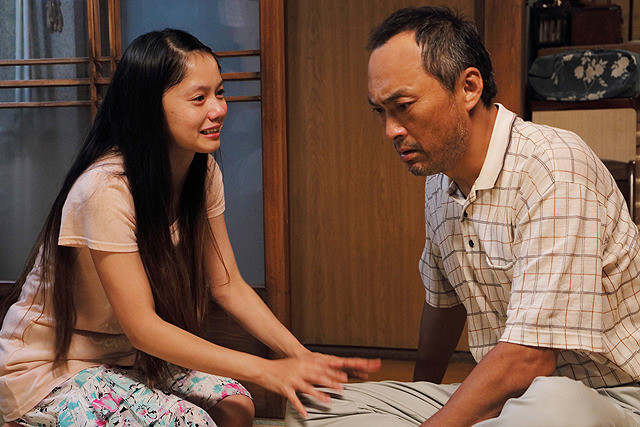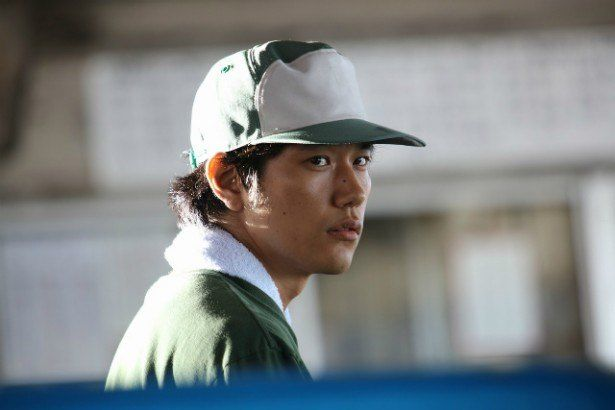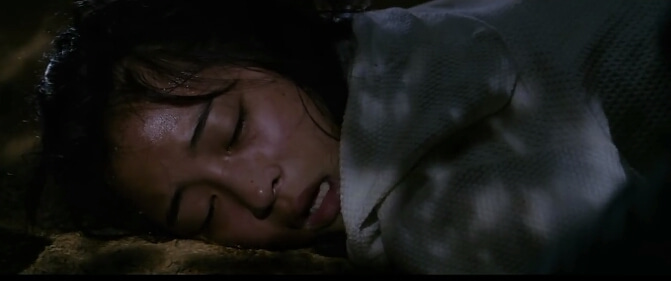Q: In particular, Hirose Suzu told in another interview that "Director screamed at her "Idiot (Bakayaro)". On the first day of shooting, you took many takes in the same scene and said you never turned the camera on that day. Why was the production so severe?
Dir Lee: No, I think I was expecting much on her potential. In terms of roles, she's going to experience things that a normal 17/18-year-old can't, and I think it's a "pain" beyond her own imagination. It's not really easy to think about it, not just the mind. For me, unless the "pain" is transmitted like a water fountain, I cannot give an OK. I think I was pretty aggressive in order to get there.
T/N for the following question: Ayano Go and Tsumabuki Satoshi live together for filming but after his scenes, Ayano ghosted Tsumabuki. (Like in the movie)
Tsumabuki Satoshi: There are a lot of wonderful scenes from a movie perspective, Naoto (Ayano's role) takes a good look when he's in contact with me on the scene. I think that's the moment of Naoto’s absolute happiness. Especially about romance. It felt like it was cut off.
Ayano Go: I got out during the shoot. And when I came back and reunited with Tsumabuki in the studio for the first time in a few days, he ran with an adult face version of a kid and hugged me. I can't forget that face (lol).
Watanabe Ken: That's just like a dog that's been abandoned (lol).
Tsumabuki: I was happy that you came back.
Ayano: Also, when I was watching the movie, I was surprisingly calm and thought, "Oh, Yuma (Tsumabuki) has such a face when he's with other men." The face is worse than when he was looking at me (lol).
Matsuyama Kenichi: These two are completely a couple (lol)
Q: Producer Kawamura barely go to the site
Prod. Kawamura: During "Villain (2010)", I went to a shoot where Tsumabuki strangled Mitsushima Hikari's neck, but it ended up taking Dir. Lee 3D3N to shoot that one scene. Since then, I am particularly careful not to go to Dir. Lee's shooting site.
Prod. Kawamura: Dir. Lee repeated 70 takes in the first scene of Hirose Suzu, and he didn't turn the camera on at all. Ppl would ask, "How is the first take different from the 70th take?" However, by repeating 70 takes in the first scene, the final product will change greatly. Rather than how that scene changes, actors who play that scene change. Dir. Lee can wait for that person to change. Normally you can't wait. There are times when I can't understand his commitment to shooting. But, thanks to his personality, I think we have made it this far.
Watanabe Ken: All Dir. Lee's movies hurt. Not only "I'm impressed" type but also "deep pain in my heart" type. Recently, there are a lot of movies with a good taste, so I don't think young people have a chance to see such movies. Fortunately, this movie was seen by relatively young people. I think they have experienced some sort of "danger" in the movie. It is necessary for Japanese movies to have such works remaining alive. I feel that this is a movie that will survive 10 or 20 years from now.
Q: Moriyama, for Okinawa-hen, seems to have actually lived alone on the uninhabited island before the filming. Where did your motivation come from?
Moriyama Mirai: I think the movie scene is a place like Iaido (T/N: Japanese Martial art). There are ppl from various departments on the scene and a sense of being cut or cut (T/N: like Iaido), and the first step is very important. We don't have time to share work with the staff through reharsals like the stage, so it suddenly feels like I'm in a pit. That sensation is what I like about movies. However, you need to prepare yourself in order to be able to come to the scene with a composure. As such preparation, I chose to live on an uninhabited island.
Q: It is often said that the site is tough.
Watanabe: I think Dir. Lee is just honest about what he wants to shoot. If he doesn't think it's really good, he won't give OK. So, in a way, I was convinced of my performance for the ones that given OK. It's very reliable in a sense.
Q: This film deals with issues of high social concern, such as Okinawa's base issue and LGBT issue. However, despite the title "Rage", angry people do not appear. What were your thoughts on this point?
Watanabe: It's a story about what it means to believe in people through the events surrounding the murder case. I think that Dir. Lee basically focuses on the weak. Those who are not the strongest people in society, but who have some weaknesses or pains, right?
Dir Lee: It's what behind anger. Rage/Anger looks like a furious emotion on the surface, but there is fear and anxiety behind it. Those things amplified and come out as anger. Not all angry people are confident and angry, but inside, they are very afraid of something. I felt like that.
Matsuyama Kenichi: This was my first time with Watanabe Ken, so I learnt a lot. He said "There are painful-dramatic developments with Okinawa and Tokyo, but our Chiba-hen doesn't have a big conflict. So, it's "the rest" for audience. I think we need to be a general part." That word became my pillar for acting. Tashiro (Matsuyama character) is a person who has suppressed emotions, so I expressed exactly what I should express and then tried to find out how much I could perform.
Miyazaki Aoi: It was the longest and most intense two weeks of my life.
Although it is far from Miyazaki's image and described as "chubby" in the original work, she gained 7 kg to take on the role of Aiko.
Miyazaki: I've never talked to the director so much. Usually, I will wait for my heart to move rather than think with my head and play a role with myself but this time, not only my heart, I have to fully use my head. There is no easy scene, and no easy ok. I read the script over and over again and searched for Aiko's hiding somewhere. I felt like stepping into a different world.
Miyazaki: The scene where Aiko screams with full body is probably the most exposed scene of Aiko. In the script, it was just written as "慟哭" (T/N: shriek/wail with grief?). During the shoot, the director kept saying "More! More!". It was kind of emotional, so it was difficult.
Ayano Go: What's important in love is the perspective of seeing the same scenery together. Minorities can't give birth to children but the act of seeing same thing- "seeing what Yuma(Tsumabuki) sees together". I wanted to see the profile of Yuma and the scenery that he is seeing.
Tsumabuki: I was able to become Yuma because I had Go. It was the first time I could work with s/o of same magnitude and direction. There were, of course, expressions that came out because we lived together. I really love Go during the shoot. I think Go had the same feeling.
Ayano: It is no exaggeration to say that it is thanks to Tsumabuki that Naoto (Ayano) exists. My life with Tsumabuki was a lovely time.
Tsumabuki: I'm prepared for Dir. Lee's movie. I'll do whatever I can, and I will expose myself to what I've never seen before. We work together every 5 year. I want to see my own growth and Dir. Lee's growth, too. When we respect each other, I think we can do with so much greed.
Suzu: I thought it's a "start from zero" with Takara (Role: Tatsuya), and was locked in for about 9 hrs at rehearsal. Even so, the dir called me "idiot" at the scene. Altho I was prepared, I became so sad that I couldn't see the front more and more, I became more sad doing it.
T/N: Suzu and Takara won their respective roles through auditions.
Suzu: Up until now, I saw veteran actresses and actors as "good", but this time, I didn't feel "good" or "bad", I just felt what they were living as a role.
Suzu: Dir. Lee said "I don't know correct answer for this scene" But when he told me, "At the moment they press your mouth, it feels like your heart is torn", I was full of emotions. It took a long time to shoot, for 2 days. After that, honestly, I was uncomfortable touching ppl.


















No comments:
Post a Comment